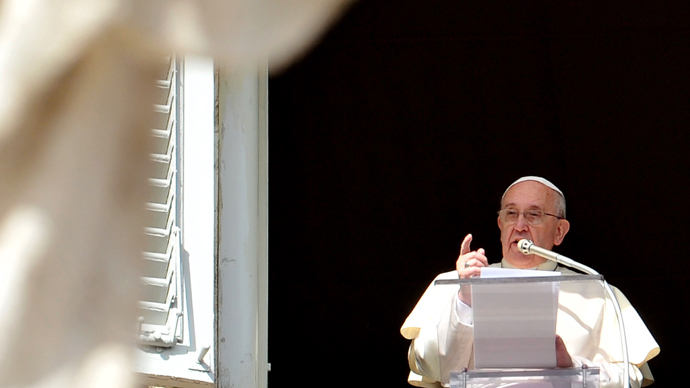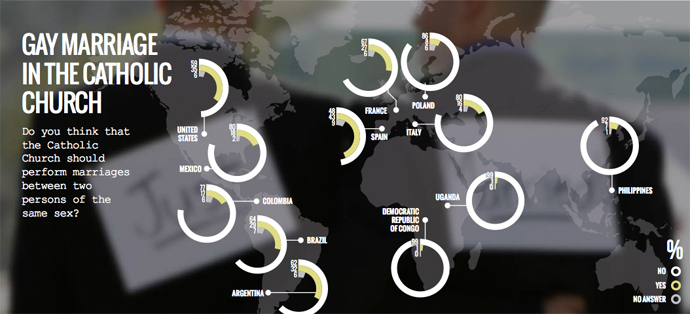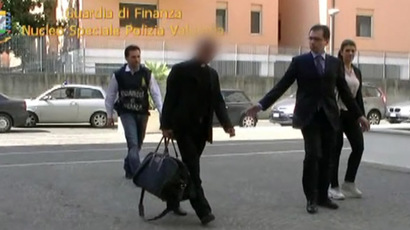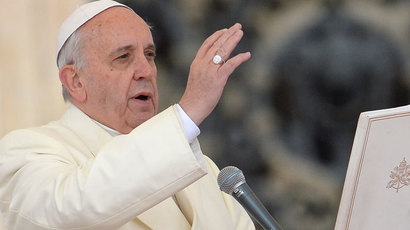Pope more popular than preaching: New poll shows Catholics disagree with doctrine

The overwhelming majority of Catholics believe that Pope Francis is doing an excellent or good job. However, they disagree with the church’s teachings on the acute issues of contraception, abortion and divorce, a recent poll shows.
78 percent of respondents said they supported the use of artificial birth control, according to the results of the survey, released on Sunday. The poll was conducted among more than 12,000 Catholics in 12 countries, and was commissioned by the US Spanish-language network, Univision.
Endorsing contraception appears to be the issue on which the global Catholic community is most united. 65 percent of respondents worldwide believe abortion should be allowed in some, or all cases, and 58 percent oppose church teachings on divorce.
The survey has drawn a portrait of the average church doctrine supporter.
“Most similar to the Catholic Church’s position are 55 year old and above, married men and women who live in small, rural areas and who attend mass frequently,” the pollsters say.
The gap between the church’s teachings and what the majority of Catholics think of them is in no way damaging the popularity of Pope Francis, who will celebrate the first anniversary of his papacy in March. 87 percent of Catholics believe that Francis is doing a good, or even excellent job.
Where most Catholics do tend to share the church’s stance is opposition to gay marriage. Two thirds of the respondents agree with the doctrine on that.

The issue however highlights deep divisions within the global Catholic community itself. 99 percent of respondents in Uganda oppose gay marriage, while the figure is only 30 percent in Spain.
The question of whether women and married men should be priests garnered almost equal portions of positive and negative answers.
The survey shows most of the doctrine supporters are in the developing economies of Africa and Asia, while Catholics in Europe or North America tend to increasingly question church teachings. The tendency was noted by Ronald Inglehart, founding president of the World Values Survey, an ongoing global research project.
“Right now, the less-developed world is staying true to the old world values, but it’s gradually eroding even there,” Inglehart told The Washington Post. “[Pope Francis] doesn’t want to lose the legitimacy of the more educated people.”
The Vatican has been aware of the discrepancy between its teachings and attitudes towards them. It launched its own survey last year to see what Catholics thought of issues like divorce, contraception and gay marriage. German bishops were the first to file the results of the survey last week. They showed most respondents were unhappy with the doctrine.
"The Church's statements on premarital sexual relations, homosexuality, on those divorced and remarried, and on birth control… are virtually never accepted, or are expressly rejected in the vast majority of cases," the report said, as cited by Reuters.
The results are to be discussed in October 2014 at an extraordinary assembly of the Synod of Bishops, only the third one, since the advisory body was created in 1965.
The preparatory document to the event says priests have to be ready for “many new situations requiring the Church’s attention and pastoral care,” including inter-religious marriages, single-parent families, and an increase in the practice of surrogate motherhood.
The Vatican has recently been criticized by the UN Human Rights Committee for its attitudes toward contraception and abortion. The criticism formed a part of the report, issued last week, which primarily blamed the Vatican for indulging longstanding policies enabling priests to sexually abuse children. The Catholic Church described the report as distorted, unfair and ideologically biased.
Regarding criticisms on the Vatican’s stance on homosexuality, abortion and contraception, Archbishop Silvano Tomasi, the Holy See observer to the UN in Geneva, said the UN cannot ask the Church to change its "non-negotiable" moral teachings.














